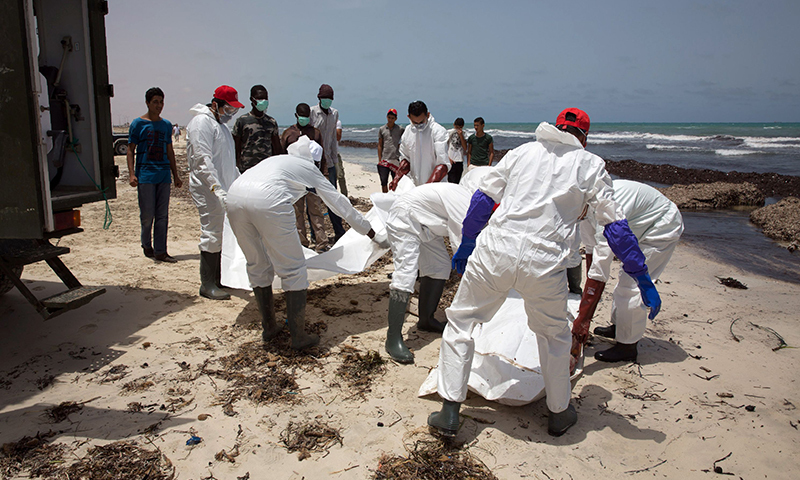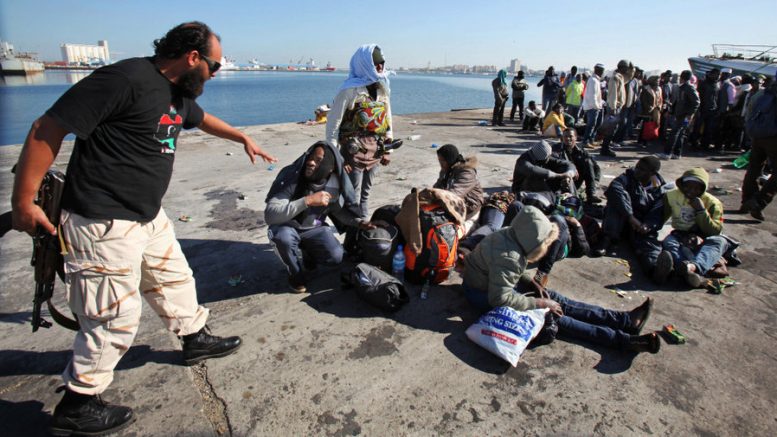A joint report launched today by the United Nations Support Mission in Libya (UNSMIL) and the Office of the UN High Commissioner for Human Rights (OHCHR) citied “unimaginable” human rights violations and abuses of migrants in Libya as a result of the breakdown in the crisis-riven country’s justice system.
“People smuggled or trafficked into Libya face torture, forced labor and sexual exploitation along the route, and many while held in arbitrary detention,” Martin Kobler, the Secretary General’s Special Representative for Libya and Head of UNSMIL in a news release.
The report, entitled Detained and Dehumanised: Report on Human Rights Abuses against Migrants in Libya also stated that migrants were held in detention centers mostly run by the Department for Combatting Illegal Migration (DCIM), and had no access to lawyers or judicial authorities, no formal registration, and no legal process.
In addition, some migrants were held in “connection houses,” on farms, in warehouses and inside apartments. They were forced to work and earn money for their onward transport. “We are called animals and are treated as animals,” a 16-year-old boy from Eritrea had told UNSMIL.
The report also described armed men, allegedly from the Libyan Coast Guard, abusing migrants by bringing them to shore, beating, robbing, and taking them to detention centers.
“The list of violations and abuses faced by migrants in Libya is as long as it is horrific. This is, quite simply, a human rights crisis affecting tens of thousands of people,” said Zeid Ra’ad Al Hussein, the UN High Commissioner for Human Rights.
The report also urged Libyan officials to immediately release the most vulnerable migrants, with a view to urgently ending all arbitrary detentions; reduce the number of detention centres; ensure women were held separately from men; improve conditions of detention and protect detainees from torture and all other forms of abuse; and, in the medium-term, decriminalize irregular migration and adopt an asylum law.
In addition, “the report lays bare the suffering endured by these migrants who have experienced unimaginable abuse and, in some cases, fallen victim to the despicable trade in human lives,” stated High Commissioner Zeid, adding that the report “appeals to our compassion and our resolve that the rights of migrants should be fully protected and respected, whatever their status.”
Irregular migration was against the law in Libya, which was why migrants were being detained. As a result, OHCHR urged the country to adopt a regular asylum law. UNSMIL also said that it has received reports indicating that some Libyan State employees or local officials may have been involved in the smuggling and trafficking process.
Thousands of sub-Saharan Africans are either stranded, imprisoned, and have been detained and abused in Libya.

Libyan Red Crescent personnel retrive bodies of migrants washed up on a Libyan beach
On a recent day at the military airport in Tripoli, the Libyan capital, a Libyan fighter lines up 115 Nigerians to be deported.
More than ready to leave, the women and men gather their meager belongings.
“I came here to make money,” says 32-year-old Fred Igbinosa. “I spent three years here now, but I see that everything has changed, so I have to go back to my country because the crisis is too much for me. I don’t want to die young.”
Like many sub-Saharan Africans, Igbinosa traveled to Libya illegally, working before the war in one of the many foreign companies located in the country.
During the war, things took a turn for the worse. A rebel group captured Igbinosa and imprisoned him as a suspected mercenary in Gadhafi’s forces
“They tied our hands behind our backs, beat us up and locked us in jail,” Igbinosa recalls. “I told them I was not a fighter, but they could not believe us. They treat us so badly there, so many people even died inside the prison there.”
Black women in particular, are continuing to face harassment. All of the women NPR spoke to said they had been propositioned or called a prostitute, and they all know women who were raped.
Choma Imbebusi says she came to Libya to find work six months ago but instead lived in fear.
“It’s a hardcore time. We stayed indoor for almost two months. There was no water, they raped people,” Imbebusi says. “So many bad experiences. I know one woman, she was raped mercilessly, they took her money, it’s so obviously bad.”
Jeremy Haslam is the International Organization for Migration’s mission chief in Libya.
“Without question, there is a perception that sub-Saharan Africans are some way or form associated with the previous regime and, indeed, potentially they could be mercenaries. And unfortunately, all sub-Saharans are branded with that same stigma. So that’s one of the root causes of their persecution,” he says.
Haslam says the IOM has evacuated hundreds of thousands of foreign workers, but the situation is still dire for the many who remain.
“The problem is now, as things tail off in what is perceived to be the end of the humanitarian crisis, is that some of these needs are being neglected,” he says.
“In Tripoli, for example,” Haslam says, “we have no safe and secure transit facility from which to process migrants, to take them out of harm’s way, because there are some very vulnerable cases, but there are also incidents of arbitrary arrest and abduction.”
No Easy Way Out
Salah Abu Bakr has a master’s degree in accountancy from his native Somalia. But because of the civil war there and a lack of opportunities, he came to Libya, hoping to catch a boat to Europe. He shows visitors around the makeshift camp in Tripoli where he and other Africans have been living.
“We don’t have beds and we don’t have enough mattresses,” he says, walking down a hall filled with water and garbage.
The conditions are dirty and difficult, but there is regular medical attention from Doctors Without Borders, regular food from an aid group called Islamic Relief and it’s protected from the violence outside.
But they won’t be there much longer.
“We were told that the camp will be closed. Clearly, we don’t know what is happening,” Abu Bakr says.
The local authorities say that the Chinese company that owns the compound will be coming back. So they have been moving people out, in some cases offering them jobs as sanitation workers.
But others like Abu Bakr say if they can’t get to Europe, they want to go home. The problem is that most don’t have documents, and it’s not clear how they can be repatriated. So they are stuck in limbo, aid workers say.

